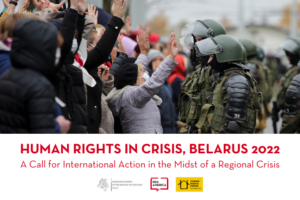Two Years After the Rigged Belarus Election, the United States Can Do More to Call Out Aleksandr Lukashenka’s Abuses

The fraudulent election of Aleksandr Lukashenka as president of Belarus on August 9, 2020 surprised no one. Everyone expected him to ‘win,’ but very few wanted him to. Now, it is more important than ever for the United States to continue to call out Lukashenka’s grave human rights abuses.
Belarusian organizations and activists had demanded a free and fair election. Crowds in Minsk and other Belarusian cities celebrated pro-democracy candidates, including Svitlana Tikhanouskaya, who took over her husband’s campaign after he was arrested, but the lead up to the election was characterized by mass protests, detentions and arrests, including that of well-known political writer Ihar Losik and the opposition presidential candidate Viktar Babaryka.
After announcing that Lukashenka was reelected with an alleged 80% majority, the regime responded to the protesters with an information blackout across the country—and then with violence.
These events, now almost two years ago, resulted in a mass exile of pro-democracy activists mostly to Lithuania and Poland. More intense repression of those still in Belarus continues. Pro-democracy and human rights advocates around the world have tried tirelessly to support organizations and individuals whose safety in Belarus is compromised. One year ago, international human rights organizations issued a joint call to demand the release of political prisoners captured in raids on publications and activist groups. There have been concerted efforts to host panels and discussions on human rights in Belarus at convenings of the United Nations Human Rights Council and United National General Assembly to keep Belarus on the world’s agenda. PEN America put on readings in solidarity with Belarusian people.
Even more impressive are the efforts within Belarus to continue supporting journalists, activists, and writers. Even after its liquidation, PEN Belarus has continued to work in exile researching cultural and human rights. The Belarusian Society of Journalists (BAJ) was recently awarded the UNESCO Guillermo Cano Press Freedom Prize, and the human rights center Viasna has published constant updates and statistics on political imprisonment in Belarus.
Lukashenka and his regime’s collaboration with Putin on the use of the Belarusian border for the initial invasion of Ukraine has gravely undermined much of the world’s support for Belarus. More than ever, it is crucial to distinguish those who reside in Belarus from the cruel actions of Lukashenka’s Putin-backed regime; like Ukrainians fighting a war against Russia, Belarusians have been engaged in an anti-Russian ideological battle for as long as Lukashenka has been in power. As Amy Mackinnon described so well in a recent Foreign Policy report, the outcome in the war in Ukraine will also impact the future of democracy and human rights in Belarus.
While that future remains uncertain it is more important than ever for the United States to continue to use its voice and leadership to call out Lukashenka’s abuses and show support for those fighting against dictatorship inside and outside Belarus. In the winter of 2021, six months after falsified election results sent Belarusian civil society into disarray, PEN America invited members of Congress to speak out in support of the protestors and to state their commitment to free speech, free expression, and other basic human rights. Months later, a congressional resolution offered commendations, and hope, to the people of Belarus as they demand a democratic future.
The Biden administration must follow up on the resolution; what is required now is a consolidated effort to counter Belarusian tactics that involve internet censorship, prolonged detention in terrible conditions, and extensive torture. The U.S. government must continue to condemn these tactics and publicly call for the release of the 1262 political prisoners in Belarus including 98 cultural figures (as of Aug. 8); all together there are 114 cultural figures unjustly detained.
As the Belarusian border is used for war, and as the world begins to ignore Belarusian civil society on account of the government’s heinous participation in the invasion of Ukraine, the United States can play an important role in shoring up support for human rights and democracy in Europe, a region strategically important for the US. Whether by pushing for accountability among Lukashenka’s administration or promoting civil society organizations that offer aid to targeted and repressed individuals in Belarusian society, now is the time to make this change.
About PEN America
PEN America stands at the intersection of literature and human rights to protect open expression in the United States and worldwide. We champion the freedom to write, recognizing the power of the word to transform the world. Our mission is to unite writers and their allies to celebrate creative expression and defend the liberties that make it possible. Learn more at pen.org.
Contact: Suzanne Trimel, [email protected], 201-247-5057






